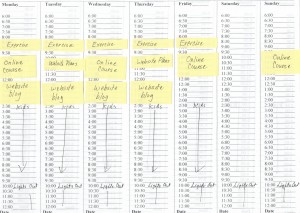An adult coaching client arrived the other day in a high state of anxiety and overwhelm. First we reviewed how the emotional control aspect of executive functioning dominates the brain. His anxiety was shutting down his capacity to use metacognition to plan and problem solve, which was only exacerbating the problem. He was teetering on being emotionally paralyzed, unable to move forward on any of his goals.
Here is how I coached him through his troubles.
Step 1: Calm the Emotions
By first acknowledging that it was his brain, and not him, that was out of control, we lowered the guilt and opened the window to calm down problem solve instead of reacting.
Next, I applauded him for showing up and asking for help. I reminded him that when our own brain is challenged, it is time to borrow someone else’s brain to get out of our confusion, helplessness, and hopelessness. Getting help can be critical to ending overwhelming feelings.
Step 2: Get the Big Picture
After the emotions were calmed down and he felt supported by another person, it was time to apply strategies.
First, we put down his three “pressing” issues on the dry erase board. The first problem, completing the construction of a website, was addressed by asking: is this deadline negotiable or is it written in stone? Since he was the one who had set the deadline, it was actually flexible. We decided to move that deadline into the future to give him some breathing room. That left two more projects, one of which had a two-week deadline and the other, an online class, required constant time and attention each week.

Step 3: Find the Space
To end that sense of being overwhelmed, we got out our time management tools: our week planning sheet, a small stack of sticky notes, and a pair of scissors.
First, we decided how much time and space he needed each week to work on those two pressing goals.
Using the scissors, we cut sticky notes into pieces that would correspond one-to-one with the hourly spaces on the week sheet.
Then he placed the sticky notes over the time of day he was going to allot to those tasks. When he had finished doing this he could now see that it was actually going to all fit. He had a concrete picture of how it would all get done. My client realized he could get it all done if he kept his day plan in sight. Armed with a picture and a plan, he left a much calmer person.
What can you do today to calm your feelings of overwhelm?

